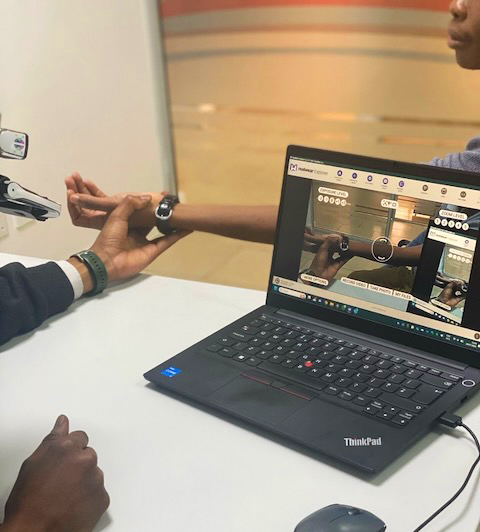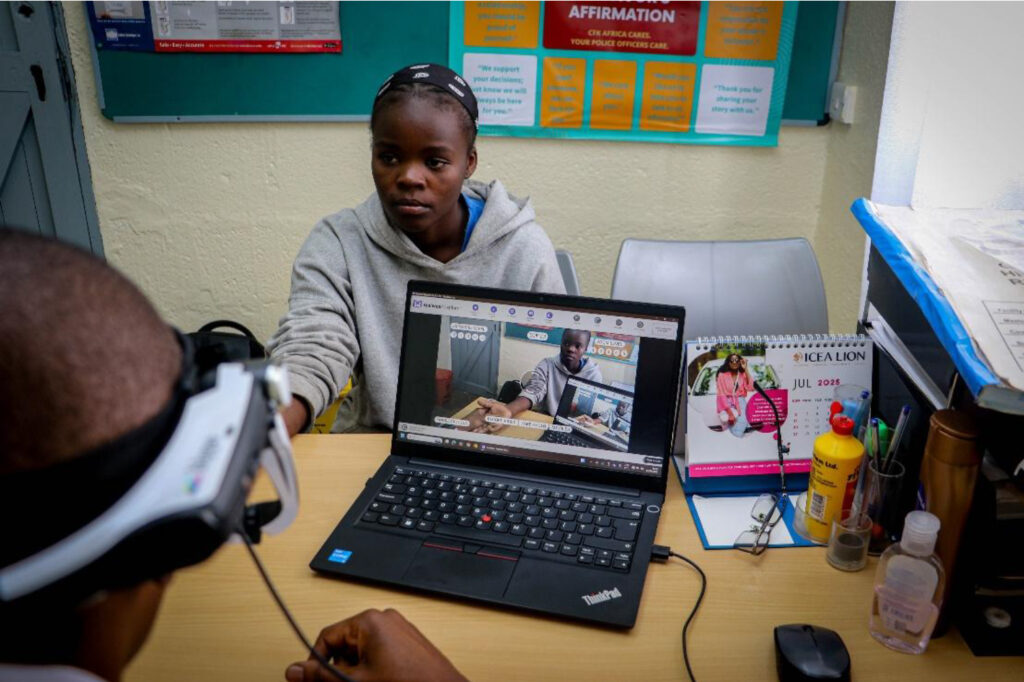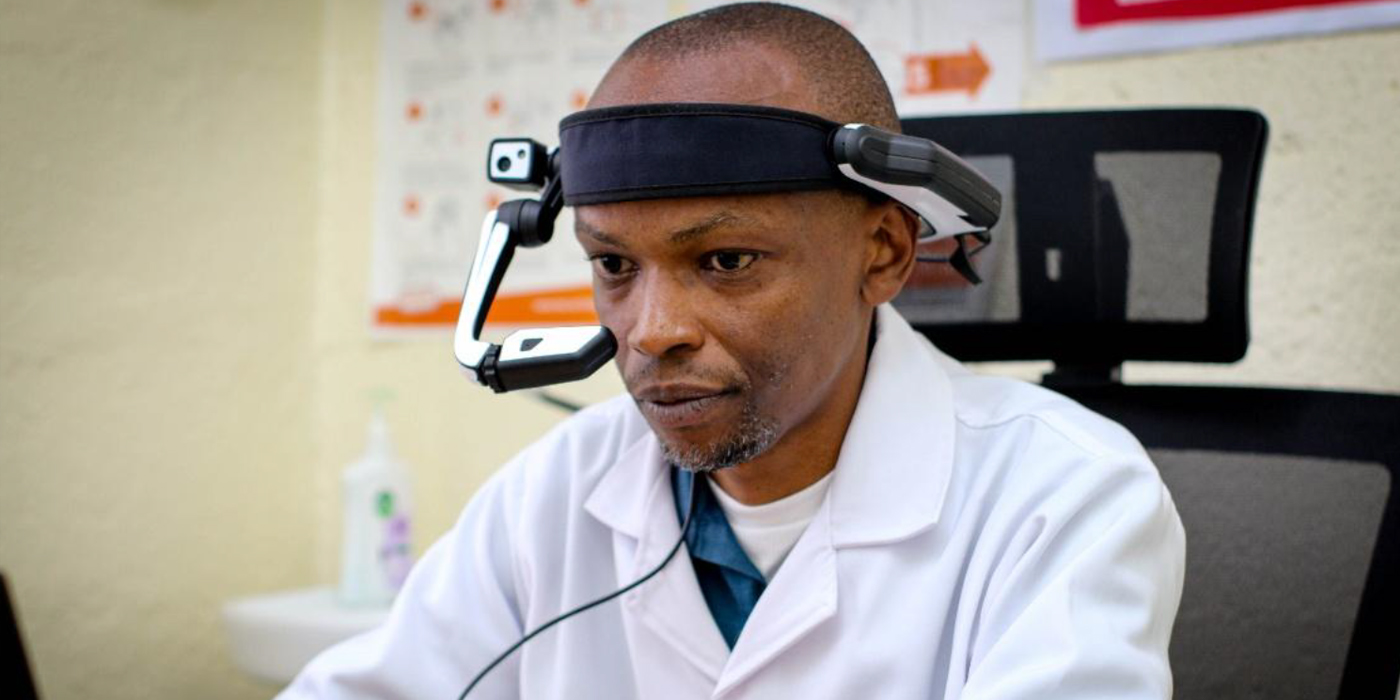Transforming Healthcare in Kenya: How Dr. Dennis Kinoti and Hippo Virtual Care Are Reaching the Unreachable
In the heart of Kibera, one of Africa’s largest informal settlements, Dr. Dennis Kinoti is leading a quiet revolution. Armed with a wearable headset and a commitment to bring specialist care to underserved communities, Dr. Kinoti is redefining what healthcare delivery can look like in low-resource settings.
Dr. Kinoti, Clinical Service Lead at CFK Africa, oversees clinical services across three health facilities that serve more than 56,000 patients annually. From maternal care to chronic disease management, his team faces a daunting array of healthcare needs on a daily basis. But thanks to the Hippo Virtual Care platform and headset, they’re now equipped with a powerful tool to close the care gap.
At the core of Dr. Kinoti’s approach is the Hippo Headset – an augmented reality-enabled, voice-activated device that provides a “through the eyes of the clinician” experience. By wearing the headset, frontline health workers can stream real-time video and audio to remote specialists, enabling joint consultations even when miles apart.
“I had a child come to the facility with tonsillitis,” Dr. Kinoti recalls. “I called my pediatric ENT colleague Dr. Reuel K. Maina, showed him the patient’s throat using the Hippo Headset, and within minutes had a diagnosis and treatment plan.” This type of collaboration not only saves time but also ensures patients receive high-quality, specialized care without the need for costly or logistically challenging referrals.
Beyond clinic walls, the Hippo platform is proving invaluable for home-based care. In communities with ambulatory challenges, poor infrastructure or limited transportation options, patients often go unseen. Dr. Kinoti’s team now equips nurses with the Hippo headset to conduct remote consultations from patient homes. Live video feeds allow Dr. Kinoti or another clinician to observe, advise, and even direct physical exams remotely.
“Kenya’s network infrastructure isn’t perfect,” Dr. Kinoti admits, “but the headset is surprisingly adaptable. We take photos or short videos when live streaming isn’t possible, and review them back at the clinic.” In a country where digital infrastructure varies drastically, this flexibility is vital.

Dr. Kinoti and Hippo are now charting new ground with a proposed pilot program involving 20–30 community health workers (CHWs). These CHWs already serve as the first point of contact for thousands of households, providing essential care, behavior change communication, and referrals. By equipping them with the Hippo platform, CFK Africa hopes to dramatically scale up their impact.
“Each CHW covers about 100 households,” says Dr. Kinoti. “With 30 of them, that’s 3,000 homes reached. Imagine the exponential benefit if they could instantly consult a physician when they encounter a complex case.”
In Kenya, where affordable Android smartphones are common, the Hippo platform’s compatibility with mobile devices means CHWs can carry specialist expertise in their pocket – or on their head – at all times. The result? Faster diagnoses, better triage, and reduced patient load at overburdened and under-staffed facilities.
What makes the Hippo model so effective isn’t just the tech – it’s the philosophy behind it. Dr. Patrick Quinlan, Hippo’s CEO, calls it “Treat and Train.” When CHWs or nurses engage with remote physicians through Hippo, they’re not just delivering care – they’re learning.
“Every consultation becomes a mentorship opportunity,” says Dr. Quinlan. “It’s about building local capacity while solving immediate problems.”
This approach is especially powerful in maternal health, an area of particular concern in Kibera. Home births by untrained traditional attendants still pose significant risks. Dr. Kinoti believes that upskilling midwives and CHWs via Hippo could drastically reduce complications and improve outcomes for both mothers and infants.

The range of use cases is wide. From monitoring bedsores in immobile patients to managing chronic diseases like diabetes, the Hippo platform enables earlier intervention and ongoing support. As Dr. Kinoti notes, “We’re seeing more diabetes and type 1 cases due to lifestyle changes. Remote monitoring can help us catch complications before they escalate.”
The headset’s ability to capture and share clinical visuals also enables more efficient multidisciplinary case discussions – a luxury rarely available in under-resourced health systems.
In contrast to many tech-driven solutions, Hippo’s model is built for sustainability. There are no per-user license fees, and training is straightforward. For facilities like CFK Africa that operate on tight budgets, this makes widespread deployment both practical and scalable.
According to Dr. Kinoti, the Hippo Virtual Care platform is “the futuristic model for the best technology I can ever lay my hands on.” Its voice command responsiveness, intuitive navigation, and seamless connectivity have made it a natural fit even in settings where technical training is limited.
At its heart, the story of Dr. Kinoti and Hippo is about human connection – enabling care that is personalized, timely, and effective, no matter where the patient lives. As global health systems wrestle with staff shortages and rising costs, the Kenya case study serves as proof that innovative technology, when guided by real-world needs and partnerships, can truly transform care delivery.
From Nairobi to New Orleans, Hippo Virtual Care is building a new model of healthcare – one headset at a time.

